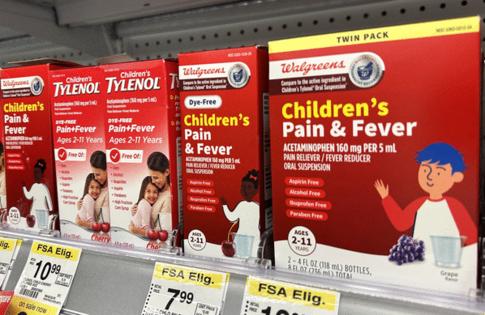Commentary: Autism, Tylenol and the perils of easy answers
Published in Op Eds
Half of all pregnant women take acetaminophen — better known as Tylenol or paracetamol — to relieve pain or reduce fever. The drug has been around for decades, is available without a prescription, and is often one of the few options doctors consider safe during pregnancy.
However, on September 23, the Food and Drug Administration announced that it would require new warning labels, citing a “possible association” between prenatal use and autism in children.
The agency’s language was cautious. President Donald Trump’s, by contrast, was not.
“Don’t take Tylenol,” he declared in a nationally broadcast statement. “Fight like hell not to take it.”
The clash highlights a recurring pattern in health debates: Preliminary science is met with sweeping political declarations, even when the evidence is thin. In this case, the consequences could be serious for mothers, children and public understanding of autism.
Autism is characterized by differences in social communication and behavior. The reported prevalence has increased in many countries over the past several decades, prompting widespread concern and, in some cases, a relentless search for the cause.
Researchers emphasize that the rise in autism diagnoses has far more to do with better recognition, broader diagnostic criteria and greater public awareness than with an actual surge in cases.
The best available science does not support a causal link between Tylenol and autism. A landmark study from Sweden analyzed health records of nearly 2.5 million children born between 1995 and 2019. It found only a negligible difference in autism diagnoses — 1.42 percent among those exposed to acetaminophen in the womb compared to 1.33% among those not exposed. When researchers compared siblings, one of whom had been exposed and one who had not, the difference vanished entirely.
A separate study from Japan this year, involving more than 200,000 children, reached the same conclusion. Both studies suggest that earlier hints of a link may have been explained not by the drug itself but by “confounding factors”: mothers who take acetaminophen are often unwell during pregnancy, and those underlying illnesses may influence outcomes.
That did not stop Trump, joined by Health Secretary Robert F. Kennedy Jr., from presenting acetaminophen — and, once again, vaccines — as suspects. Never mind that decades of careful research have debunked any link between vaccines and autism. Never mind that acetaminophen has one of the longest safety records of any drug used during pregnancy.
The danger of this political theater is twofold. First, pregnant women may be frightened away from the only pain and fever medication that doctors reliably recommend, leaving them to suffer or to turn to riskier alternatives.
Second, focusing on tenuous links to drugs or vaccines deflects attention from the more pressing needs in autism research — such as understanding the genetic and neurological underpinnings, improving support for autistic people, and addressing the day-to-day challenges families face. Worse, it perpetuates a pattern of blaming mothers for their children’s conditions, fostering guilt and stigma without evidence.
If acetaminophen is not to blame for autism’s apparent rise, what is? The answer lies primarily in how society now defines and recognizes autism. Clinicians diagnose adults and children. Parents seek diagnoses to secure benefits. Awareness campaigns encourage people to pursue evaluations. These changes swell the numbers without reflecting an actual explosion in cases.
That may not make for a snappy sound bite, but it’s the reality. Autism is complex. It involves genetics, brain development, and, in some cases, nutritional or environmental influences. Reducing it to a story about a common painkiller — or a vaccine — is not only misleading; it’s harmful.
Public health demands accuracy and humility. Regulators must communicate carefully about scientific uncertainty, making clear what is known, what is not, and what remains to be studied. Politicians must resist the temptation to turn complex evidence into easy applause lines.
Acetaminophen has helped countless pregnant women get through pain and stubborn fevers. Stripping it of trust without good reason risks replacing one set of problems with another. Autism deserves serious, evidence-based inquiry — not scapegoats.
_____
ABOUT THE WRITER
Henry I. Miller, a physician and molecular biologist, is the Glenn Swogger Distinguished Fellow at the American Council on Science and Health. He wrote this for InsideSources.com.
_____
©2025 Tribune Content Agency, LLC.
























































Comments